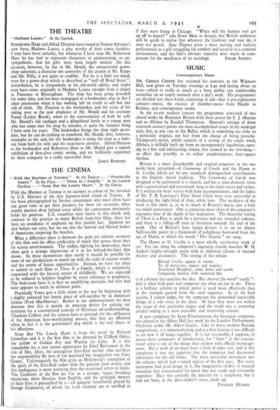"Madame Louise." At the Garrick.
THE THEATRE
ROBERTSON HARE and Alfred Drayton have found in Vernon Sylvaine's new farce, Madame Louise, a play worthy of their comic faculties. I may have been unlucky, but whenever I have seen Mr. Robertson Hare he has had to represent characters so uninteresting, so un- sympathetic, that his gifts have been largely wasted. On this occasion, however, he has in Mr. Mould, the unsuccessful gown- shop salesman, a character not unworthy of the creator of Mr. Kipps and Mr. Polly, if not quite so credible. For he is a little too dated, even for a gown-shop which is described as "well off Bond Street "; nevertheless, he is sympathetic in his old-world oddity, and might even have come originally to Madame Louise straight from a chapel in Penzance or Birmingham. The shop has been going downhill for some time, and has been mortgaged to a bookmaker, who in Act I takes possession when it has nothing left on credit to sell but one roll of cloth. Mr. Drayton is the bookmaker, and the scene of his taking over as the new employer of Mr. Mould and his assistant Penny (Lesley Brook), when to the consternation of both he sells Mr. Mould's old cardigan and a dilapidated kettle to a young man who has come into the shop by mistake, is quite the funniest thing I have seen for years. The bookmaker, brings the shop right up-to- date, but he can do nothing to transform Mr. Mould, who, however, triumphs in the end, for the bookmaker is using the shop as a hide- out from both his wife and his racecourse enemies. Alfred Drayton as the bookmaker and Robertson Hare as Mr. Mould give a superb exhibition of first-class comic acting, and are brilliantly supported by their company in a really successful farce.
JAMES REDFERN.


























 Previous page
Previous page